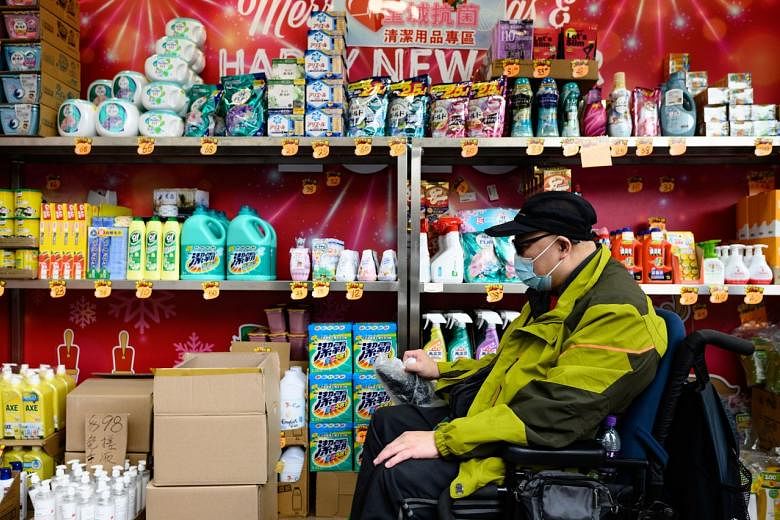HONG KONG (AFP) - Hong Kong's disabled residents and their carers say they feel increasingly trapped in their apartments and abandoned by the authorities as the coronavirus-struck city is engulfed with panic-buying and face mask shortages.
For the last fortnight, queues have sprung up across the densely packed business hub as Hong Kongers jostle for the latest delivery of face masks, toilet rolls and cleaning products.
It is a free-for-all that Mr Steven Yan dreads. Diagnosed with muscular atrophy 14 years ago, Mr Yan uses a wheelchair to get around.
He has tried to find face masks near his apartment but has only succeeded once in the last month, queuing for six hours to get his hands on five free masks.
"It exhausted me," Mr Yan told AFP. "I dared not move, fearing that I might lose my spot."
With just 40 masks at home to share among him, his wife and teenage son, Mr Yan has started cutting back on going out in public, including to his regular medical check-ups.
Public hospitals have stopped supplying masks to visiting patients to save vital equipment for staff in a city where more than 60 people have been diagnosed with the coronavrius.
"I have to wear a mask in hospital but we can't afford that now," Mr Yan said, lamenting that prices for face masks have soared in recent weeks as the government has resisted implementing price controls or rationing.
ENTRENCHED INEQUALITY
Despite being one of the richest cities in the world, Hong Kong has a profound wealth gap and a limited safety net for society's most vulnerable.
Of the some 600,000 disabled people in the city, a third live below the poverty line according to government data. Some 200,000 people also act as carers.
Ms Lam Chun, 64, looks after her 19-year-old nephew full time. He has Prader-Willi syndrome - a genetic disorder that makes the person feel constantly hungry and often leads to diabetes and obesity.
When she goes out to get groceries, she relies on a makeshift cloth mask to cover her face, even though it offers limited protection.
"I always miss the information about masks because I don't really know how to go online," Ms Lam said, noting how many Hong Kongers find out about restocked pharmacies through Facebook or family Whatsapp groups.
Both Mr Yan and Ms Lam said they had received little help from local authorities in securing masks.
"It turned out that the government did not do anything to protect people like us and I am deeply disappointed," Ms Lam said.
The Social Welfare Department did not respond to requests for comment on what measures it was taking to ensure disabled and other vulnerable residents received masks.
Responsibility has largely fallen to volunteers and the charity sector.
FRAYED NERVES
Hong Kong leader Carrie Lam recently said 1.6 million masks would be given to local charities to hand out to vulnerable people.
And Mr Joshua Wong, a pro-democracy activist who was previously jailed for leading protests, said his party had secured 1.2 million masks from Honduras and would distribute them through their network of local councillors.
There have been growing calls in some sectors for the government to implement price caps or to ration face masks in a bid to curb shortages and spiralling prices.
After a brief bout of panic buying in nearby Taiwan, authorities introduced new rules limiting each person to buying just two masks a week through a system connected to their national health card.
But in Hong Kong, which revels in its free market status, authorities have so far resisted market intervention.
Mr Yan said he felt constantly anxious in recent weeks.
"People like me are more vulnerable in the face of diseases," he said. "Maybe you are hearing my voice today and seeing my corpse tomorrow."











